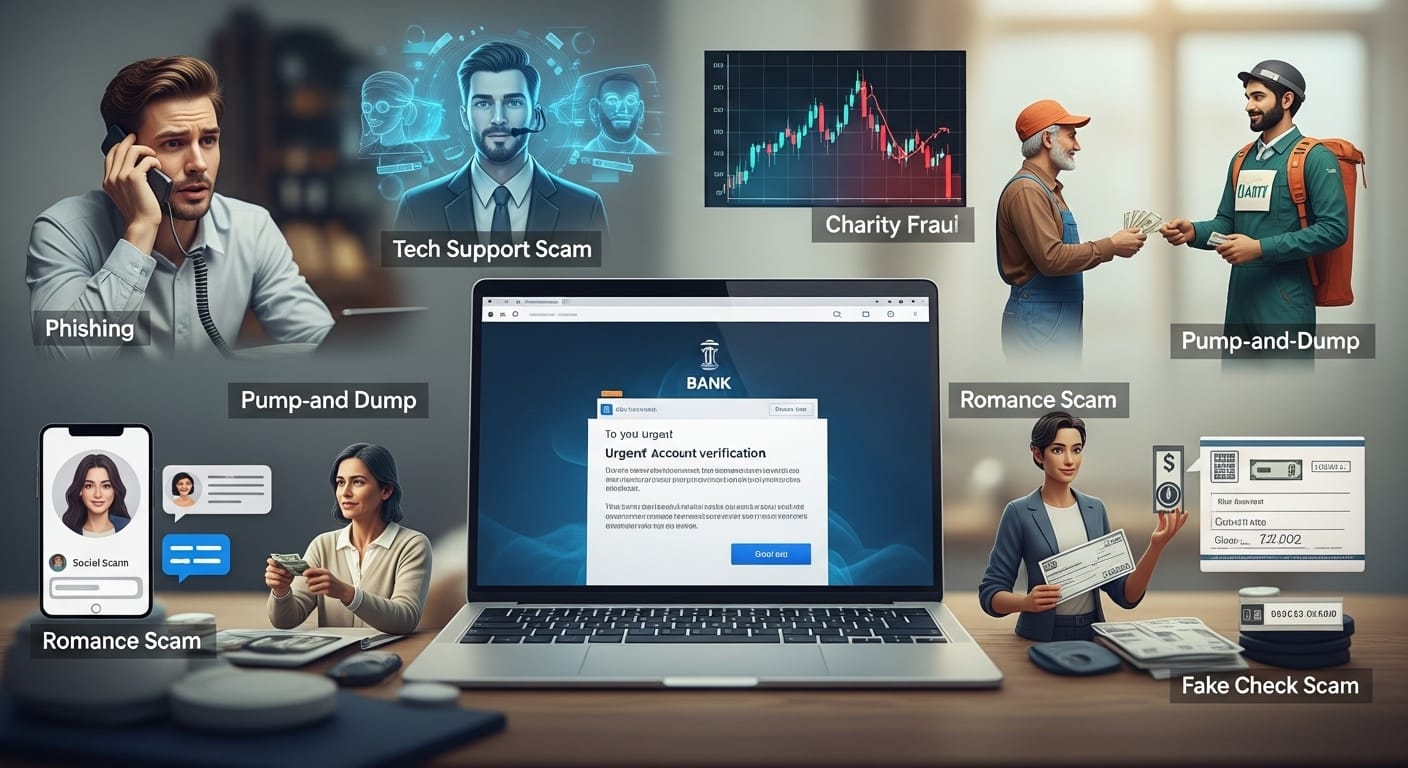Picture this: You’re scrolling through your emails, minding your own business, when suddenly, you get a message from your “bank.” The subject reads something like “URGENT: Your account has been compromised!” You panic. Your heart races. Before you know it, you’re giving away all your sensitive information to someone who probably doesn’t even know how to spell “bank.”
Congratulations, you’ve just experienced one of the many financial scams out there. But don’t feel bad—you’re not the only one. Financial scams have become more sophisticated, and if you’re not careful, you could be the next victim. So, let’s dive into the wild world of scams and see how you can protect yourself from them.

Top Takeaways and Key Concepts
Verify Before Clicking: Always confirm the sender’s legitimacy before clicking links or sharing personal data.
Research Investments: Avoid opportunities promising guaranteed or unusually high returns; always investigate thoroughly.
Ignore Unsolicited Wins: Never pay fees or provide information for unexpected lottery or sweepstakes notifications.
Be Cautious with Online Relationships: Avoid sending money to online acquaintances or romantic interests you haven’t met.
Confirm Charities and Tech Support: Donate only to verified charities and never grant remote computer access to callers.
Summary of This Article
The article outlines common financial scams and strategies to protect yourself. It covers phishing, fake investments, lottery and sweepstakes fraud, romance scams, fake charities, and tech support scams. Key advice includes verifying senders, researching opportunities, ignoring unsolicited winnings, being cautious with online relationships, and confirming legitimate charities and tech support contacts. By staying vigilant and skeptical, you can safeguard your money, personal information, and digital security from increasingly sophisticated scammers.
Phishing Scams: The Classic Trap

Phishing scams are like the old-school tricksters of the digital age. They’re usually emails or text messages designed to look like they come from legitimate companies or even government agencies. The goal? To trick you into revealing personal information, like passwords, Social Security numbers, or credit card details.
Phishing emails can be pretty convincing. They’ll often mimic the language and style of real companies, and they might even use a logo or color scheme that looks just like the real deal. And here’s the kicker—they tend to create a sense of urgency. “Immediate action required!” they say. “Your account will be locked unless you click this link!” Honestly, it’s like they’re trying to make you feel like you’re about to lose your last remaining chocolate bar in a world full of thieves.
What happens when you fall for it? Well, they get your data, and before you know it, your bank account is empty, or worse, your identity is stolen. That’s why it’s crucial to always verify the sender and never click on suspicious links. And no, your bank is never going to ask for your password over email.
Fake Investment Schemes: Where ‘Too Good to Be True’ Lives

I know what you’re thinking: Who in their right mind would fall for a “guaranteed 500% return on investment”? Well, it turns out, quite a few people do—every day. These scammers usually pose as investment experts or representatives from “exclusive” opportunities. They promise returns so high they sound like something out of a fantasy novel. “Retire early!” they say. “Double your money with zero risk!”
You might be wondering, “How could I fall for something so obviously ridiculous?” The truth is, scammers are good. They’ve perfected the art of building trust. They’ll often try to get you to invest in high-risk, unregulated products like cryptocurrency or fake stocks. By the time you realize it’s a scam, the money’s gone, and they’ve disappeared into the ether.
Here’s the key: If someone is offering you an investment opportunity that sounds like it’s too good to be true, it probably is. Always do your due diligence and research any investment opportunities thoroughly before handing over your hard-earned money. Also, remember—if an investor claims they can guarantee a return, run for the hills.
Lottery and Sweepstakes Scams: Free Money? Yeah, Right

Who doesn’t love the idea of winning a giant lottery prize? Well, scammers know this and use it to their advantage. They’ll send out fake notifications telling you that you’ve “won” a large sum of money. The catch? They’ll ask for a small “processing fee” or other personal information before releasing your supposed winnings.
Let’s be clear: If you didn’t enter a lottery or sweepstakes, you didn’t win. Simple as that. These scams can be especially tricky because they play on people’s dreams of easy money. The fraudsters know that the thought of winning big might cloud your judgment, and before you know it, they’ve got your credit card number and your personal details.
So, the next time you get an unsolicited “winning” notification, ask yourself, “Did I buy a ticket? Did I enter a sweepstakes?” If the answer is no, then the answer is also no to giving away your info.
Romance Scams: Love Isn’t Always What It Seems
Romance scams are probably the most heartbreaking of them all. They prey on vulnerable individuals looking for love. The scammer pretends to be someone who genuinely cares about you, often striking up an online relationship. After a few sweet exchanges, they’ll ask for money—sometimes for an “emergency” or a plane ticket to come see you.
It’s a tough one because it taps into human emotions. These scammers are manipulative, and they’ve perfected their pitch to play on your feelings. They often create fake social media profiles using stolen photos of attractive individuals, and before long, they have you believing in a long-distance love story.
But here’s the twist: After the money is sent, they vanish into thin air, and your bank account is left emptier than your inbox after you unsubscribed from all those spammy emails.
If you’re online dating, especially on social media or apps, keep an eye out for anyone who seems to be rushing things or who avoids meeting in person. It’s a major red flag. True love doesn’t need an emergency fund.
Fake Charities: Do You Want to Be a Hero?
Oh, look—a heartbreaking cause that desperately needs your help! But wait, who exactly are you helping? Scammers often disguise themselves as charity representatives looking to collect donations for a cause that tugs at your heartstrings. They might claim to be collecting funds for a recent disaster, medical bills, or veterans in need.
While giving to charity is a noble thing, these scammers count on your compassion to line their pockets. They create fake websites that look incredibly convincing or send out emails claiming you’ve donated before (when you haven’t). And here’s where it gets really tricky—they might even offer you a tax deduction for your “donation,” making you feel like a good Samaritan while they laugh all the way to the bank.
So, how can you avoid falling for a fake charity? Do some research before donating, and only give to organizations you trust. Check out charity review sites like Charity Navigator or GuideStar, which will help you verify whether a charity is legitimate or just a scam looking to steal your money.
Tech Support Scams: They’re Here to “Help”
I know this sounds like something out of a bad 90s sitcom, but it’s happening right now: Tech support scams. The scammer calls you pretending to be from a major company like Microsoft, Apple, or any of the other tech giants. They’ll tell you that your computer has a virus or some other critical issue that needs immediate attention.
Of course, they’ll ask for remote access to your computer so they can “fix” the problem. What they’ll really do is access your personal files, install malware, or ask for a payment to “resolve” the issue. And let’s be honest—your computer’s probably fine, it’s just your bank account that’s been compromised.
Here’s a golden rule: If someone calls you out of the blue claiming to be tech support, hang up. Real tech support won’t cold-call you, and they definitely won’t ask for remote access to your system.
Resources
FTC – How to Recognize and Avoid Scams
https://www.consumer.ftc.gov/articles/how-recognize-and-avoid-scams
Scams and Frauds – AARP
https://www.aarp.org/money/scams-fraud/
Identity Theft Resource Center
https://www.idtheftcenter.org/
Frequently Asked Questions
What are the most common types of financial scams?
Common financial scams include phishing, fake investments, lottery and sweepstakes fraud, romance scams, fake charities, and tech support scams.
How can I recognize a phishing scam?
Phishing scams often mimic legitimate companies, use urgent language, and ask for sensitive information like passwords or account details via email or text.
What should I do if I receive an unsolicited lottery or prize notification?
Ignore it. Legitimate lotteries never ask for fees or personal details to claim winnings, especially if you never entered in the first place.
How can I avoid fake investment schemes?
Research thoroughly, verify credentials, and avoid any investment promising guaranteed or unusually high returns—it’s a major red flag for fraud.
What are signs of a romance scam?
Scammers often build online relationships quickly, avoid meeting in person, and ask for money for emergencies or travel. Genuine partners don’t request funds.
How can I verify if a charity is legitimate?
Check the organization’s registration and reviews on trusted sites like Charity Navigator or GuideStar before donating. Avoid donating through unsolicited messages.
What should I do if someone calls claiming to be tech support?
Hang up immediately. Real tech companies don’t cold-call customers or request remote access to computers. Contact the company directly if in doubt.

Kevin Collier is a legal expert passionate about simplifying complex legal concepts for everyday individuals. With a focus on providing clear, practical information, he covers a wide range of topics, including rights, responsibilities, and legal procedures. Kevin aims to empower readers with the knowledge they need to navigate the legal landscape confidently, ensuring they can make informed decisions regarding their legal matters. Through insightful articles and easy-to-understand resources, he helps demystify the law, making it accessible to all.










